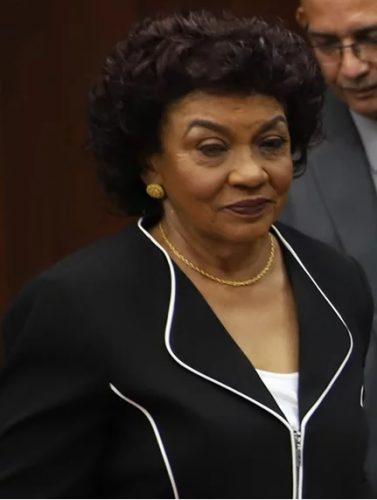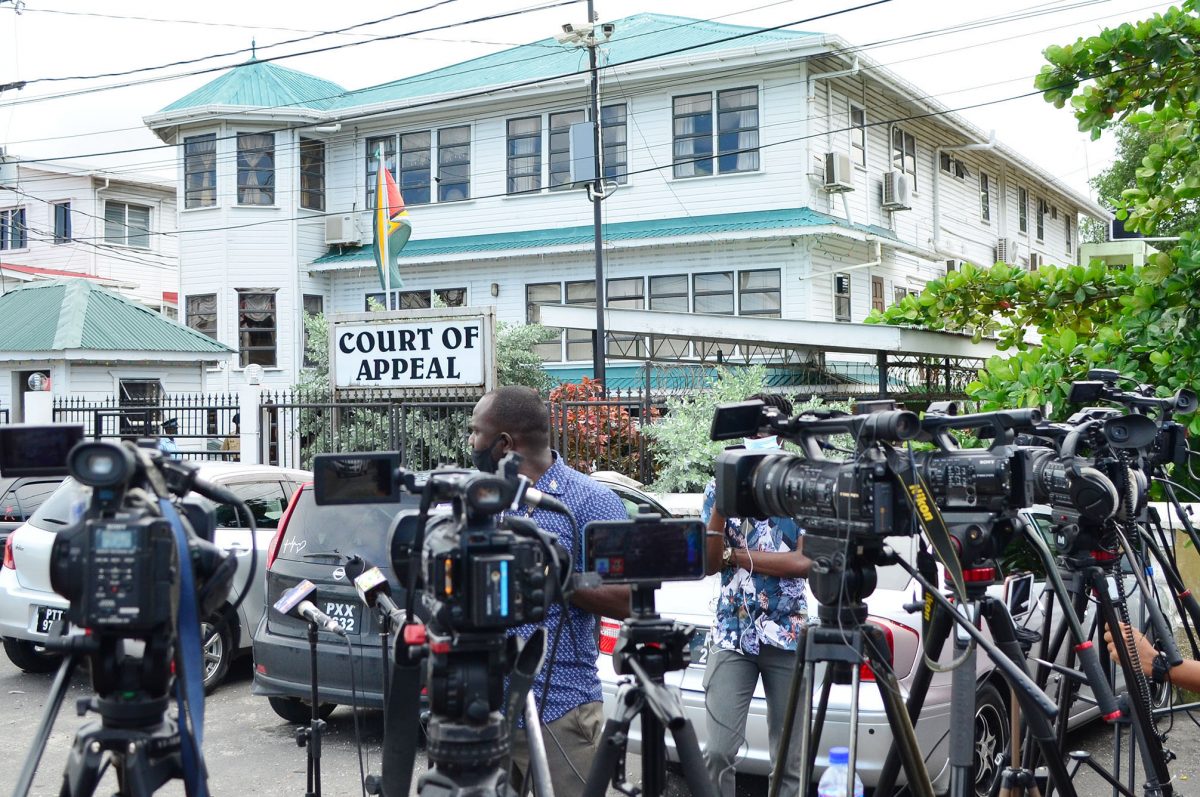Underlining the supremacy of the Constitution, GECOM Chair Claudette Singh yesterday urged the dismissal of a case before the Guyana Court of Appeal seeking to stop the declaration of results for the March 2nd general elections.
The hearing of the case – seen as a last ditch attempt to prevent the declaration of the PPP/C as the winner – is set for 11 am today. The PPP/C and other opposition parties were yesterday joined to the matter after they applied for this at a case management hearing.
In her affidavit drawn up by attorney Kim Kyte-Thomas in the case of Eslyn David vs the Guyana Elections Commission (GECOM), Singh argued that an incomplete election cannot be vitiated and an unelected president cannot be disqualified.

“It is respectfully submitted that such a challenge cannot be entertained at this time on the basis that it is premature. Any challenge to the validity of an election and any dispute or claim of any irregularities or illegalities in relation to an election can only lawfully form the basis of an election petition after the result of the election has been made known,” Justice (retired) Singh argued in her submission to the Court.
Singh is the second named respondent in the case. The Commission and its Chief Election Officer (CEO), Keith Lowenfield have also been named but are unrepresented before the Court. The fourth named respondent is Attorney General Basil Williams.
David, through her attorney, Mayo Robertson, has asked the appellate court to declare that GECOM has failed to determine a final credible count and or the credibility of the result of the elections and on this ground is seeking several orders.
She wants the court to grant an order restraining the CEO from complying with the Chairperson’s direction and prohibiting GECOM from determining the final credible count and or the credibility of the elections. She also wants the court to grant orders restraining the CEO from submitting the elections report to GECOM, which she is contending contains votes which are not credible.
She has mounted the challenge via a provision in Article 177 (4) of the Constitution which says that that court shall have exclusive jurisdiction to hear and determine any question as to the validity of an election of a President in so far as that question depends upon the qualification of any person for election or the interpretation of the Constitution.
However, the Chairperson maintained in her response that an application of Noscitur a sociis, the “context rule” of statutory interpretation, would show that the words in Article 177(4) relate to interpretation of the constitutional provisions in relation to the qualification of any person for election to the office of the President.
“The Court of Appeal is therefore not vested with original jurisdiction to hear questions on the interpretation of the constitution outside of this narrow special jurisdiction. It is the High Court which is so vested,” the submission stressed, while adding that a reading of the entire article 177 also shows that the article contemplates a person already declared by GECOM as president.
“It is respectfully submitted that the electoral process has not reached this stage. In any event, the [first] Order sought amounts to the interpretation of an Order and not the Constitution,” Singh’s affidavit further argued.
Act in vain
The Chair then address-ed the Orders sought and explained that to grant these requests is to act in vain.
“Even if the court grants the orders sought, what is the next position? Can this court direct GECOM what to decide? Can this court order GECOM to hold a fresh election? Are these orders even sought? The short answer is no since this is not an election court,” the submission concludes.
Similar arguments have been submitted by the People’s Progressive Party/ Civic (PPP/C), which is one of seven political parties which have been granted permission to respond to the application.
At the case management meeting yesterday, Justice Dawn Gregory on behalf of the Court agreed to have the PPP/C with representation from Trinidadian Senior Counsel Douglas Mendes and attorneys Devindra Kissoon and Anil Nandlall joined to the case. Also made party to the case are A New and United Guyana, The New Movement and the Liberty and Justice Party, as represented by Ralph Ramkarran and Timothy Jonas, as well as The Citizenship Initiative and Change Guyana, with representation from attorney Kashir Khan.
Each respondent was granted until 6 pm yesterday to respond to the initial application while the applicant was given until 6 am today to respond. The substantive case will be heard today at 11 am.
GECOM was on the verge of holding a meeting today for the declaration of results but decided to await the hearing of the case.
‘Misconceived’
In a 20-page submission to the court, the PPP/C argued that the application should be dismissed as the Court holds no jurisdiction to entertain it.
“The grounds of the Motion are all without merit and invite this Court of Appeal to fall into serious constitutional error… [additionally] every complaint which has been raised is capable of being (addressed) in an election petition which will ultimately be subject to the oversight of this Court of Appeal,” it concludes.
The party argues that the application is fundamentally misconceived for a number of reason including that Article 177 (4) has not been activated because Guyana’s parliament never developed regulations governing its implementation as provided for in Article 177(5). The Court of Appeal, therefore, has no jurisdiction, they contended.
Article 177 (5) provides that subject to the provisions of the Constitution, Parliament may make provision for giving effect to the provisions to the Article and, without prejudice to the generality thereof, may make provision with respect to the persons by whom, the manner in which and the conditions upon which proceedings for the determination of any question such as is mentioned in 177 (4) may be instituted in the Court of Appeal.
“Article 177(4) does not come into being until provision is made under 177(5). The making of those provisions is needed in order to complete the definition of the power or jurisdiction of the Court of Appeal or alternatively is a condition precedent to the exercise of the jurisdiction,” the PPP/C asserted.
It further presents the same argument raised by Singh that the wording of Article 177 (4) shows that it is only capable of being invoked after the election of a president has occurred.
With reference to several sections of Article 177, the party stressed that a president is not elected until so declared by the Chairman of the Commission.
“While Irfaan Ali is the presidential candidate in respect of the list which obtained the greatest number of votes, he has not yet been so declared by the Chairman of GECOM. Were it otherwise, President Granger would no longer be in office, and Irfaan Ali would now be the President,” they argued adding that since there has as yet been no declaration of the election of a President, the Court’s jurisdiction cannot be invoked.
“There is simply no basis for any determination under Article 177(4) as the election is a sine qua non [absolutely necessary] to the exercise of any Article 177 (4) jurisdiction. This application is premature,” they conclude.
Other arguments presented include that the relief sought falls outside of the scope of Article 177 (4) as it neither seeks any interpretation of the Constitution nor the invalidation of an election of President; this relief can only be claimed in an election petition which the Constitution does not permit to be heard in the first instance by the Court of Appeal and finally that there is not sufficient evidence placed before the Court of Appeal to permit it to make any determination as to the validity of an election.
“Such determination can only judicially be arrived at after a trial process capable of and sufficient to permit the resolution of factual disputes,” the party said of an election’s validity.
Apart from Justice Gregory, Justices Rishi Persaud and Brassington Reynolds are also presiding in the matter.




